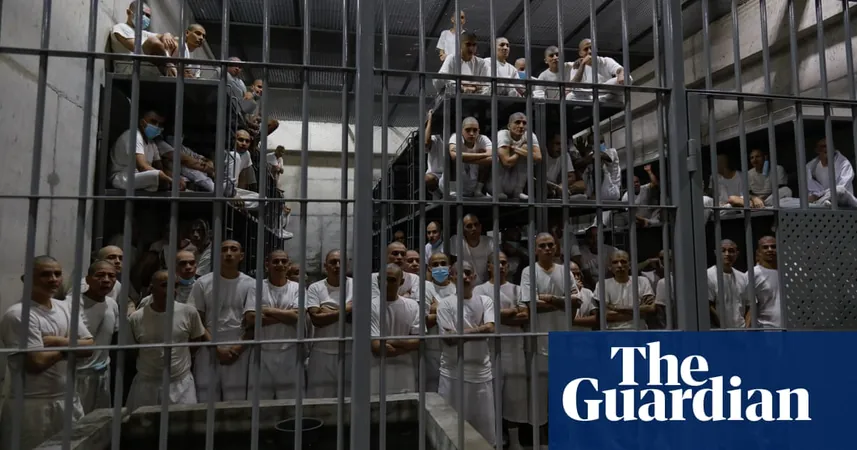
Unmasking the Crisis: How Rising Imprisonment Rates in Latin America Fuel the TB Epidemic
2024-12-25
Author: Yu
Rising Tuberculosis Cases in Latin America
Experts are ringing alarm bells over a surge in tuberculosis (TB) cases tied to the spiraling incarceration rates in Latin America, a region witnessing a worrying paradox in public health. While the global incidence of TB has been declining, Latin American countries find themselves grappling with a staggering 19% increase in cases from 2015 to 2022, directly correlated with rampant imprisonment rates.
A Groundbreaking Study
A groundbreaking study featured in The Lancet Public Health challenges previously held assumptions about TB’s primary risk factors in the region. Unlike in Africa, where HIV/AIDS remains the predominant concern, this research implicates prisons as key contributors to the rising TB crisis in Latin America.
Focus of the Investigation
The investigation focused on six major countries—Brazil, Colombia, Mexico, Argentina, Peru, and El Salvador—that collectively account for nearly 80% of TB cases in the region and an alarming 82% of its prison population. From 1990 to 2019, the prison population in these nations skyrocketed from approximately 260,000 to over 1.3 million. Dr. Julio Croda, an infectious disease specialist from Brazil's Oswaldo Cruz Foundation, concludes that nearly one-third of all TB cases since 1990 have been linked to incarceration.
The Situation in El Salvador
El Salvador reveals a particularly grim situation, with the study estimating that 44% of TB cases in the country are confined to its prison facilities. Following President Nayib Bukele’s contentious anti-gang emergency state declared in 2022, mass incarcerations have worsened the situation, with projections indicating dire outcomes for tuberculosis cases.
Prisons as Breeding Grounds for TB
The study highlights that prisons are breeding grounds for infectious diseases, with TB rates a staggering 26 times higher among incarcerated individuals than in the general population. Overcrowded conditions, inadequate ventilation, and poorly managed health services exacerbate the risk of TB spread.
A Vicious Cycle
Juan Pappier from Human Rights Watch identifies the vicious cycle of incarceration driven by the harsh realities of the “war on drugs,” where low-level offenders face disproportionate sentences. He critically points out that these measures have not only failed to curtail crime rates but have also fortified criminal networks within prisons, creating a closed loop of vulnerability.
Social Attitudes and Long-term Effects
Social attitudes toward punishment further complicate the crisis. Julita Lemgruber, a sociologist with experience in Rio de Janeiro's prison system, emphasizes that society often believes punitive measures must involve incarceration. However, this neglects to consider the long-term effects of exposing individuals to infectious diseases, only to release them back into the community as potential vectors for TB transmission.
Alarming Projections
Alarming projections suggest that if imprisonment rates had remained constant since 1990, at least 34,000 TB cases would have been averted in 2019 alone. A potential solution lies in policy reform; if prisoner intakes and sentencing durations were to decrease by 50% by 2034, TB incidence could drop by up to 10%.
Need for Effective Decarceration Strategies
However, even an immediate cessation of mass incarcerations in El Salvador wouldn’t revert TB levels to pre-Bukele conditions until 2034. Effective decarceration strategies will be critical to restoring lost progress in combating the TB epidemic.
Experts' Recommendations
Experts advocate for a shift towards strategic law enforcement focused on criminal leaders, combined with legislative changes promoting alternative sentences for non-violent offenders. Dr. Croda underscores the importance of improving prison conditions, stressing the immediate need for accessible health services and routine TB screenings within these institutions to better tackle the epidemic.
Conclusion and Call to Action
As Latin America faces this dual crisis of rising incarceration and TB cases, proactive solutions and systemic reforms will be paramount in reversing this alarming trend and safeguarding public health. Will the region take the necessary steps to address this pressing issue before it's too late?






 Brasil (PT)
Brasil (PT)
 Canada (EN)
Canada (EN)
 Chile (ES)
Chile (ES)
 España (ES)
España (ES)
 France (FR)
France (FR)
 Hong Kong (EN)
Hong Kong (EN)
 Italia (IT)
Italia (IT)
 日本 (JA)
日本 (JA)
 Magyarország (HU)
Magyarország (HU)
 Norge (NO)
Norge (NO)
 Polska (PL)
Polska (PL)
 Schweiz (DE)
Schweiz (DE)
 Singapore (EN)
Singapore (EN)
 Sverige (SV)
Sverige (SV)
 Suomi (FI)
Suomi (FI)
 Türkiye (TR)
Türkiye (TR)